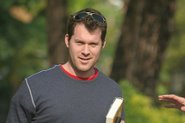

Welcome to “Up Close & Personal.” For every interview I will be introducing a literary personality, discussing his views and insights as well as upcoming literary events around the world.
Today’s interview is with Mike Maranhas. He is the author of Re'enev, which was selected by Independent Publisher Magazine as one of their Highlighted Titles for 2006.It was also selected by Foreword Magazine as a finalist for their General Fiction Book of the Year Award for 2006. The winners will be announced at Book Expo America in NYC on June 1, 2007. Re'enev was given five-star rating by Amazon’s number one reviewer, Harriet Klausner.
Re’enev is about a couple, Luke and Meesha who, while vacationing on a tropical island to reconcile their marriage, fall victim to an unknown predator that reopens their psychological wounds while trying to kill them. Think Gone With The Wind meets The Fugitive and Heart of Darkness.
Re’enev is mainstream fiction spiced with romance, suspense, action, and mystery. It captures both the beauty and fragility of marital love and human life. The story is unique in the way it conjoins an urbane couple with primitive danger, blissful sensuality with unbridled brutality, and a cerebral protagonist with a world that seems to lack reason; then, the conclusion brings unexpected redemption, but with a stunning twist and a lethal caveat. Re’enev is rare in that it appeals across genders and genres with its intense plot and candid depiction of the human psyche through relationships, crises, perceptions, and emotions—most notably, love and fear.
Mike Maranhas graduated cum laude, with a BS/BA in Accounting and Information Systems, from the University of Massachusetts at Amherst. He trades stock options when he is not writing.
Mike is dedicated to his writing career. He is aggressively marketing Re’enev, intending to eventually publish with a traditional house. As a result, Mike seeks representation, or an introduction to a publisher, that will help reach his goal
Mike is currently finishing a second novel, Running with the Pack.
He welcomes input from literary bloggers, who would consider reviewing, or discussing Re'enev. He lives in with his wife, Bela, on Cape Ann in Massachusetts. Re'enev is his first novel. He can be reached on line at mike@mikemaranhas.com, or through Pink Granite Productions at (978)-546-3239.
E. I. Please tell us about your latest book RE’ENEV and how you came up with the title?
Mike: Re'enev is the story of an urban, mid-thirties, and professional couple--Luke and Meesha--in love since their freshman year at Cornell University, who suddenly have to deal with a crisis in their marriage. A tragedy has occurred in Luke's family. The only way Luke, due to his psychological makeup, knows how to deal with his grief is by withdrawing. Meesha, who immigrated from France at age ten, reacts strongly to Luke's withdrawal. She feels abandoned by the only person she has ever trusted and this reopens an old, emotional wound. What had once been a relationship that most people can only dream about having begins to deteriorate.
As they drift apart, Luke finds comfort for his sorrow, and a reprieve from Meesha's depression-induced attacks, in the attention he suddenly receives from a female colleague. One night, Meesha accuses Luke of infidelity. Luke denies it. They argue. When they stop fighting, Luke, fatigued, falls asleep only to awaken a few hours later; something is amiss. He finds Meesha with self-inflicted wounds, losing blood rapidly.
After hospitalization and therapy, Meesha's psychiatrist recommends that the couple take a vacation--a retreat to heal from their trauma and help reconcile their marriage. They fly to the tropical island, Re'enev. For nine days, they have a blast. Luke is determined to show Meesha how much he loves her, to restore her confidence that she is the only woman for him.
On the tenth and last day of their vacation, they venture on a hike through the island's rainforest. Meesha is fearfully reluctant, but Luke encourages her to come; she complies. Luke veers off the established path against the warnings of posted signs, advice given earlier by Re'enevians, and Meesha's protests. Unbeknown to Luke, he has crossed into forbidden territory. After hiking a significant distance, Luke loses track of the meager path. While he is trying to find it, Meesha is severely injured. As Luke is applying rudimentary first aid, Meesha vanishes.
The remainder of the story is Luke's search for Meesha. He battles time, knowing Meesha's wounds will kill her if he doesn't find her soon, as well as the unknown presence in the jungle that injured Meesha and is now trying to kill him.
What I have described thus far is the top story. Re'enev, at its root, is a psychological study of an average man under extraordinary stress. It is also a Bildungsroman, which is basically a tale where the protagonist grows from his experience.
Re'enev is the word, veneer, spelled backwards. This title is symbolic of the novel's theme: Just as you cannot change things beyond your control in life, neither can you hang loose--take the good for granted, an opinion for truth, the veneer of existence for reality--or you will figuratively, if not literally, die.
E. I. What can we expect from your characters?
Mike: Luke and Meesha are typical people, in the sense that they are as flawed as they are capable. What a reader can expect is for them to act, or react, in conformance with their psychological profiles. Each is a product of his and her past. From this knowledge, the reader should be able to predict what each character will do; but, I have found from reader reviews that this is not the case. An interesting phenomenon, which I never anticipated, exists with Re'enev.
While I maintain that a reader should be able to foresee, or at least justify, Luke and Meesha's actions, most readers react to the plot based on their experiences. I've come to realize that the story is a catalyst, in that it polarizes people by their opinions about which character acted appropriately, or received what he or she deserved. The reason is obvious to me now: readers place themselves in the position of the character with whom they identify the most, and react accordingly. But I wasn't thinking in this vein when I wrote the book. I was thinking from a writer's perspective, about what I wanted the reader to derive from the story. I certainly didn't intend the book to be a psychological barometer of the reader.
E. I. Some authors after spending so much time creating their characters find that they become an extension to their life. Is that how you feel about Luke and Meesha? Do you now think of them as part of your family?
Mike: No. When I'm done writing a book, I'm done with the characters and plot. I put it behind me and look ahead. I think, because the writing process is so arduous, I need closure when I finish. I'm pleased with completing the project, but I'm glad its over. I want to move on to another subject in which I have interest.
E. I. How much of Luke's life is planned out in your head? How do you know where you will go next with him or with any of your characters?
Mike: Luke's life is not planned, nor was it ever. Both he and Meesha were undefined at the beginning. I started the novel with the simple premise of placing an ordinary guy in a jungle environment filled with hostility. I wanted to see what would happen. I found the idea exciting and wanted to flesh it out. But I had no idea who this guy was. As I progressed, I added on layers of complexity to each character, which formed their back-story and current persona. The process was organic. I ended up with Luke and Meesha and their complex relationship, all of which then drove the plot. I've had many readers ask me if there is going to be a sequel, but I haven't given it much thought. There are too many other stories to write.
E. I. Did you have any fascinating experiences while writing your book, or while conducting research for your novel?
Mike: I read roughly twenty books on the flora and fauna of tropical environments, as well as survival manuals written by the US Army and former British SAS commandos. I also hired a naturalist to lead me on a hike through a jungle. This research was interesting. But I think the best part of the process was clarifying my philosophical views. I didn't start the novel with a theme; that manifested halfway through. I began to realize I had a philosophy that correlated with my character's actions, but I had to think through this logic. I had to solidify it in my mind, then see if my characters and plot complied with it. When I realized I had established integrity between the characters, plot, and theme, I felt a bit enlightened. My subconscious had taught me something. I found this process interesting. It made wonder how much else is tucked away within the dark side of my mind.
E. I. Why have you chosen to write in the genre in which you write?
Mike: I haven't. I was told by my agent that I write Literary Fiction. I never thought about genre when I started writing. I just knew I wanted to say something with every story I told. I couldn't write a story if it didn't hold meaning for me and, therefore, the reader. It wouldn't be worth the effort. I hate reading stuff that is just plot without thematic substance, so there's no way I could expend the effort to write anything like that.
E. I. How long does it take you to write a book?
Mike: That's a tough one, for everything I've produced so far has been written between 4-6 in the morning before work, and on weekends. Re'enev, with all the rewrites and time taken off for non-writing pursuits, took a few years. However, I've quit consulting and begun working out of my house, so I should be much faster in the future.
E. I. Was there anyone who really influenced you to become a writer?
Mike: I love Steinbeck and Pat Conroy. Hemingway too. I felt the power they wielded with their words. That was something I really wanted to do. But it wasn't until I took a job as an Operations Analyst in Boston's Financial Services Industry that I developed the confidence to give it a try. I wrote all day long on that job, using analytical skills and creativity, and I loved it. After a couple years, I started to wonder how much different writing fiction would be. I discovered, of course, it is much different, but I had already developed the discipline to write for twelve hours a day. So all I had to do was learn the process. I never took a class or anything. I just wrote, let my wife read and edit , then rewrote. You do that hundreds of times and eventually you find your voice and improve your technique to a publishable level. So, I guess if there's anyone who truly influenced my writing, it was my wife, Bela.
E. I. Readers and fans often like to get behind an author's writing routine. Would you like to share with them your typical writing day schedule?
Mike: For ten years, I rose at 3:45, worked out, then wrote till six. I made it to my desk in Boston by eight. I'd get home around eight at night; eat, read, hit the sack at ten, then repeat the routine the next day. I used a lot of caffeine. On my next project, I'll probably just write for eight to ten hours each day, a little less on the weekends.
E. I. Would you call yourself a plotter?
Mike: No. I don't outline or anything like that. I'll often think about the story while I'm driving or doing something mindless, but I find that most of my ideas come while I'm behind the keyboard. It's spontaneous. I'll have no idea where I'm going, then boom! It hits me. You can't explain the subconscious. It's with you all the time, but you have to give it the right environment to produce. For me, that environment is sitting at the computer, wearing earplugs, drinking coffee, after a good workout.
E. I. What can fans look forward to from you in the coming months?
Mike: I have a manuscript titled, Running With The Pack. It's a coming-of-age novel about Kyle Sheehan, a tough, brawling yet intelligent and introspective teenager who, after a lifetime of fighting for his stepfather’s approval within a dysfunctional family, makes a heart-wrenching discovery: that his stepfather’s approval is not worth having, that the only approval worth pursuing is his own, and this knowledge sets him free. The story’s theme is the necessity of intellectual self reliance.
Although I wrote Running With The Pack prior to the spate of recent school shootings, I readily recognized the anger expressed by the assailants. I never contemplated killing classmates as a kid, but I feel that Dylan Klebold and Eric Harris could have learned a lot from my story--never mind the millions who suffer, but never pick up a gun, or the bullies who harass them. Thus, I believe the time is ripe for this tale; that many adults, regardless of age, will embrace a plot that probes a teenager’s search for identity, and a theme that emphasizes the imperativeness of emotional self-dependence. With a little more editing, Running With The Pack will be ready for publication.
E. I. Would you like to close the interview by providing any tips for aspiring writers?
Mike: Very few people make a living by writing fiction. Write for the pleasure of the process, because you have something to say, and you want to be read. If you begin with those expectations, you'll enjoy writing. If you set out to become rich and famous, the odds are that you'll fail and end up resenting the art. Work hard, enjoy the process, hope for the best--for you might be the exception--but expect modest success and you won't go nuts.
To download, sample, and enjoy the Prologue and first six chapters of Re'enev for FREE, click here.
To read Re'enev reviews on Amazon.com, please click here.
To learn more about Mike Maranhas and his writing , please click http://www.mikemaranhas.com











.png)

















1 comment:
Thanks for posting this interview. Fascinating info. Mike actually hiked the jungle to research his book...amazing!
Post a Comment